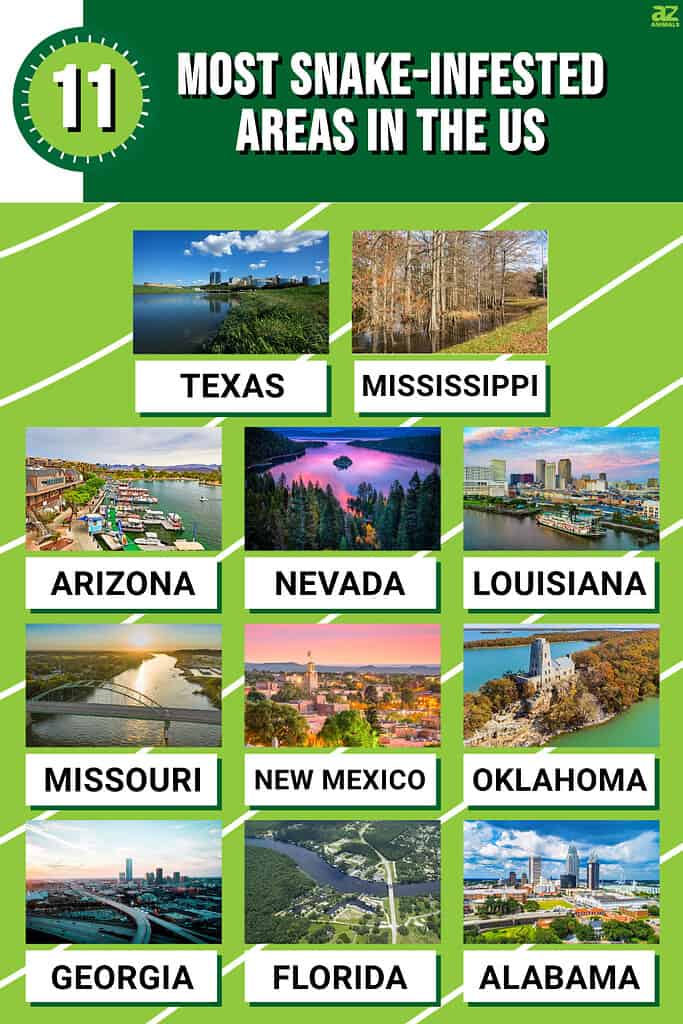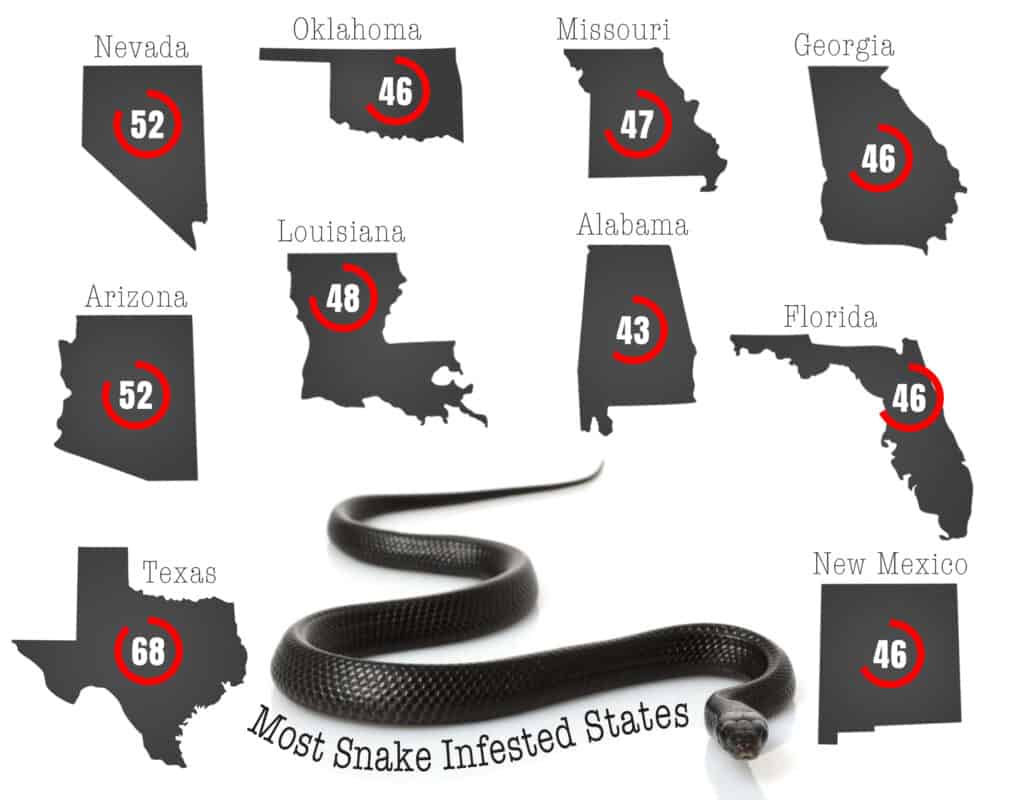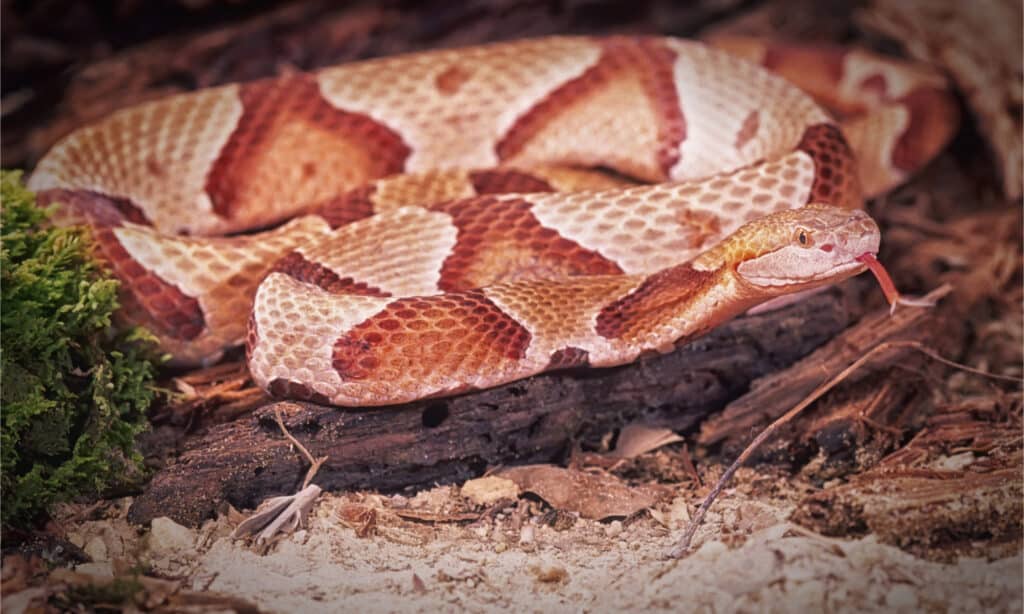
The United States is home to a large number of snake species! As you might imagine, these snakes aren’t distributed evenly among the USA’s 50 states. Instead, some areas are more snake-infested than others.

If you’re planning on going camping or hiking, suffer from ophidiophobia, or are a big fan of these reptiles, you might want to know what areas have more snakes. This article takes a look at the 10 most snake-infested areas in the U.S.
Texas

68 species of snakes are scattered all over Texas but are found in greater numbers in central Texas.
©iStock.com/33ft
Texas is home to about 68 snake species, including several rattlesnake species, copperheads, cottonmouths, and Texas coral snakes. Snakes are scattered all over Texas but are found in greater numbers in central Texas.
The Texas rat snake is one of the most popular snakes around the state. It is a nonvenomous snake, although it tries to rattle its tail to look like a rattlesnake and ward off predators. Some other snakes found all around Texas are the Texas indigo, the Texas brown snake, and the Texas blind snake.
Mississippi

Wetlands are common in southern parts of Mississippi, which create perfect habitats for some types of snakes.
©Nina Alizada/Shutterstock.com
Mississippi, which sits on the Gulf of Mexico, is a breeding ground for snakes given its swamplands. Mississippi has a total of 55 different snake species. Fortunately, only 6 species are venomous: cottonmouth, copperheads, pygmy rattlesnake, eastern diamondback rattlesnake, canebrake rattlesnake, and coral snake.
While 13% of Mississippi is made up of wetlands, which create desirable habitats for snakes, the state sits at the foot of the Appalachian mountains so there are forests, mountains, hills, lakes, grasslands, and the famous Mississippi River. Nonvenomous snakes that roam this state include multiple species of racer snakes, hognose snakes, kingsnakes, swamp snakes, water snakes, rat snakes, and ribbon snakes. Other types include the Eastern indigo snake, rough earth snake, common rainbow snake, Graham’s Crayfish Snake, and the eastern garter snake.
Arizona

Arizona’s Gold Canyon, north Scottsdale, and other open-space areas in Phoenix are heavily infested with snakes.
©Pamela Au/Shutterstock.com
Arizona is densely populated with 52 species of snakes and 14 of these are venomous. Arizona’s Phoenix area is said to have the highest number of snakes in the state. Places such as Gold Canyon, north Scottsdale, and other open-space areas in Phoenix see more snakes than others.
The state has more rattlesnake species than any other U.S. state. Some of Arizona’s most venomous snakes are Arizona ridge-nosed rattlesnake, Arizona black rattlesnake, Arizona mountain kingsnake, and the Grand Canyon rattlesnake. Many scientists believe that the Mojave rattlesnake has the most dangerous venom of any rattlesnake.
Nevada

There are more than 52 snake species in Nevada.
©iStock.com/CelsoDiniz
Nevada is known to have more than 52 species of snakes and a lot of them are found in the Las Vegas area. Although most of Nevada’s snakes are nonvenomous, the area has quite a lot of rattlesnakes to look out for. Rattlesnakes are pit vipers, making them very efficient nighttime hunters.
The western diamondback rattlesnake is one of Nevada’s most venomous snakes. It packs up to 350mg of venom per bite on average. Sometimes, they’ve been known to pack up to 800mg in a single bite. Some other common rattlesnakes found in Nevada are speckled rattlesnakes, northern Pacific rattlesnakes, Mojave rattlesnakes, and sidewinder rattlesnakes. Venomous snakes are also found in Lake Mead and Red Rock.
Louisiana

Louisiana is home to 48 different snake species scattered all around the state.
©Kevin Ruck/Shutterstock.com
In Louisiana, it can seem as if snakes exist everywhere in the state. It is said to be home to 48 different snake species. Residents in both rural and urban areas see snakes frequently. It is quite common to spot snakes on trees, in potted plants, and under piles of grass and leaves.
Some of the most popular and venomous snakes found in Louisiana are the pygmy rattlesnake, eastern diamondback rattlesnake, and timber rattlesnake.
Missouri

In Missouri, snakes are protected by law so it is illegal to kill them.
©iStock.com/Matthew Howieson
Although the Missouri mule is the state’s official animal, the state is home to 47 species of snakes. They are mostly found in the mature forests and wooded hillsides of the state. Missouri is home to five species of venomous snakes. They are western cottonmouths, eastern Massasauga rattlesnakes, Osage copperheads, pygmy rattlesnakes, and timber rattlesnakes.
Missouri takes care of its snakes too. They are protected by the law which means that it is technically illegal to kill them. There are allowances for situations where snakes pose dangers to humans. However, there is no open season on snakes.
New Mexico

There are 46 species of snakes in New Mexico.
©Sean Pavone/Shutterstock.com
New Mexico is known to have 46 species of snakes, including 7 rattlesnakes, 1 coral snake, and 38 nonvenomous species. The New Mexico part of the Chihuahuan desert is considered one of the most snake-infested areas in the state. It is said to be home to more than 20 species of snakes.
Some of the most popular snakes found in the Chihuahuan desert include gopher snakes, coachwhips, and rattlesnakes. They’re active at different times of the day, depending on the weather and the species.
Oklahoma

Oklahoma is known to have 46 species of snakes, including 7 venomous species.
©Kit Leong/Shutterstock.com
The state of Oklahoma is inhabited by 46 species of snakes, 7 of which are venomous. Most of Oklahoma’s venomous snakes are rattlesnakes such as western diamondback rattlesnakes, prairie rattlesnakes, western pygmy rattlesnakes, and timber rattlesnakes.
Oklahoma is also known to have copperheads and cottonmouths scattered about. Snakes are commonly found in the cities, forests, and prairies of the state. Oklahoma also holds the record for the longest rattlesnake found to be about 88 inches long!
Georgia

It isn’t uncommon to find snakes in urban areas in Georgia.
©Gerson Repreza/Shutterstock.com
The state of Georgia is known for its large number of snakes. There are 46 species of snakes in Georgia but only six are venomous. Snakes are primarily found in the northern mountains to the barrier islands that lay along the Atlantic coasts. However, it isn’t uncommon to find them in the city.
Some of Georgia’s most common snakes are cottonmouths, copperheads, black rat snakes, coral snakes, and timber rattlesnakes. In Georgia, it is illegal to kill any nonvenomous snake. Breaking this law is punishable by a fine of up to $1,000 and a year in jail. People living in Georgia also aren’t allowed to keep venomous snakes as pets without a license or permit from the authorities.
Florida

Some of Florida’s snake-infested areas include freshwater wetlands, coastal mangroves, dry uplands, and even residential areas.
©iStock.com/Dronegb
Florida is home to 46 species of snakes, which are found all over the state. Some of the most snake-infested areas in Florida are the freshwater wetlands, coastal mangroves, dry uplands, and even residential areas. These snakes help keep the pest and rodent population in check.
Florida has six species of venomous snakes, which are southern copperheads, eastern diamondback rattlesnakes, dusky pygmy rattlesnakes, cottonmouths, coral snakes, and timber rattlesnakes. Although the state has a lot of venomous snakes, it is illegal to capture, keep, possess, or exhibit any of them without proper permits.
Alabama

Alabama’s 43 species of snakes are typically found all over the state.
©Kevin Ruck/Shutterstock.com
Alabama is home to 43 species of snakes — many of which are commonly seen all around the state. It is quite understandable why the state records more than 100 snake bites each year. Some of the most commonly seen snakes are cottonmouths, copperheads, milk snakes, corn snakes, and watersnakes.
The state is known to have more than 10 subspecies of watersnakes, which include banded watersnakes, brown watersnakes, diamond-backed watersnakes, and the gulf swampsnakes.
4 Pacific Islands Where You Won’t See Any Snakes
Are you surprised by the number of snake species in the state you live in or in one that you’re hoping to visit? Perhaps you’d like to take a trip to a place where you won’t have to worry about coming across any slithering, venomous reptiles?
In that case, we have 4 beautiful islands in the Pacific Ocean that are completely snake-free for you to consider!
- New Zealand: It’s pretty amazing that New Zealand does not have any snakes at all, seeing as neighboring Australia is known for many deadly snake species. The country is very strict when it comes to taking preventative measures to keep snakes out in order to protect its native animals. These reptiles aren’t allowed anywhere, including in zoos, and people are prohibited from keeping snakes as pets.
- Kiribati: This is the only country that exists in all four hemispheres of the globe, located where the International Date Line and the equator meet. More than 5,000 years after it was settled, the land and coasts off Kiribati are still snake-free.
- Tuvalu: Consisting of nine small islands, Tuvalu is the fourth-smallest country on Earth. While there are no snakes on land, some sea snakes can be found in its surrounding waters.
- Nauru: You’ll find this small island country about 2,800 miles north of New Zealand. Human settlement dates back to 1,000 BC and many believe Nauru was isolated from the outside world for a long time, developing a unique culture. While the land was thought to be 100% snake-free, in recent times there have been sightings of the Brahminy blindsnake but these have been infrequent.

New Zealand is surrounded by the Pacific Ocean and 100% snake-free.
©iStock.com/jfoltyn
6 Plants That Help Keep Snakes Away From Your Yard
If you live in one of these 10 most snake-infested states and are thinking “not in my backyard!” we have some suggestions that may help!
Instead of setting traps that could harm or kill snakes (which is illegal in some states), consider a natural deterrent and make use of certain plant species to ward off unwelcome intruders.
If you’ve been burned before by a plant with false claims that it keeps snakes away, we have a list of snake-repelling plants that really work.
- Kaffir-Limes: This is a powerful snake repellent because its citrus fragrance confuses snakes by interfering with their sense of smell. If you’re not able to plant a kaffir-lime tree, try leaving its peels and juice around your home and garden.
- Green Chiretta: Snakes will definitely avoid this plant also known as the King of Bitters because its leaves irritate their skin and cause swelling.
- Basil: This tasty herb, also called clove basil, emits a smell that snakes do not like. Another way to use this is to spray your surroundings with its essential oil.
- Garlic and Onion: Snakes are not garlic lovers or fans of onions due to the sulfonic acid they both contain. Combining salt with either crushed garlic or crushed onion and sprinkling the mix around the area you want to protect is said to be effective.
- Skunk Cabbage: This plant is popular among herbalists, who use it to treat infections, but very unpopular with snakes because it is toxic to them.
Find 9 more snake-repelling plants here.

The green chiretta plant is a powerful snake-repellant as its leaves are toxic to snakes.
©pakn/Shutterstock.com
Summary Of The 11 Most Snake-Infested Areas In The US
| Rank | State | # of Species |
|---|---|---|
| 1 | Texas | 68 |
| 2 | Mississippi | 55 |
| 3 | Arizona | 52 |
| 4 | Nevada | 52 |
| 5 | Louisiana | 48 |
| 6 | Missouri | 47 |
| 7 | New Mexico | 46 |
| 8 | Oklahoma | 46 |
| 9 | Georgia | 46 |
| 10 | Florida | 46 |
| 11 | Alabama | 43 |
Honorable Mention: North Carolina #1 For Snake Bites

The venomous copperhead snake is among those responsible for snake bites in North Carolina.
©outdoorsman/Shutterstock.com
North Carolina didn’t quite make the cut for our list of states with the most snake species. North Carolina has 37 snake species in total. While this may not sound that impressive, North Carolina stands out above all other states for snake bites. In fact, the snake bite rate in North Carolina is 157.8 bites per million population annually. Since the population as of 2021 was a little over 10 million (10.55 to be exact), if we were to calculate it off of 10 million, that would average out to roughly 1,580 reported snake bites per year.
The top 6 states for reported snake bites are:
- North Carolina 157.8 bites per million
- West Virginia 105.3 bites per million
- Arkansas 92.9 bites per million
- Oklahoma 61 bites per million
- Virginia 48.7 bites per million
- Texas 44.2 bites per million
There are 6 different kinds of venomous snakes inhabiting North Carolina: copperhead, cottonmouth, eastern coral snake, eastern diamondback rattlesnake, pigmy rattlesnake, and timber rattlesnake. In the year 2019, there were 92 people bitten by venomous snakes in that state.
The photo featured at the top of this post is © Gerson Repreza/Shutterstock.com
Thank you for reading! Have some feedback for us? Contact the AZ Animals editorial team.






